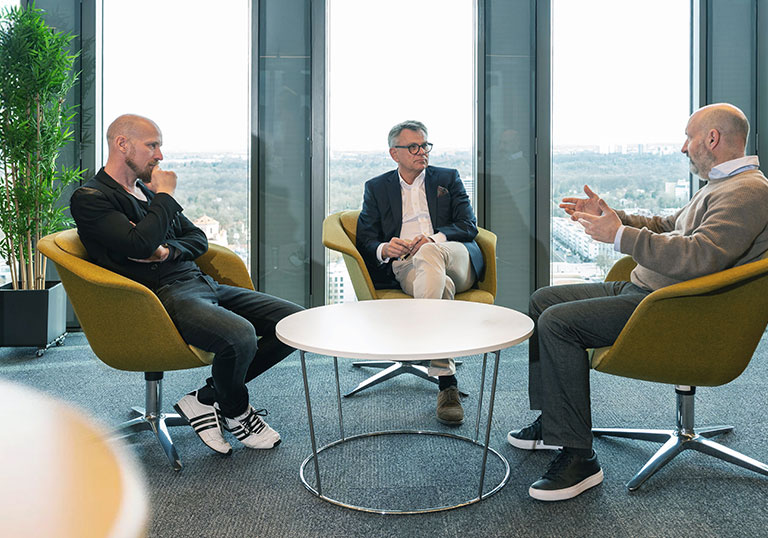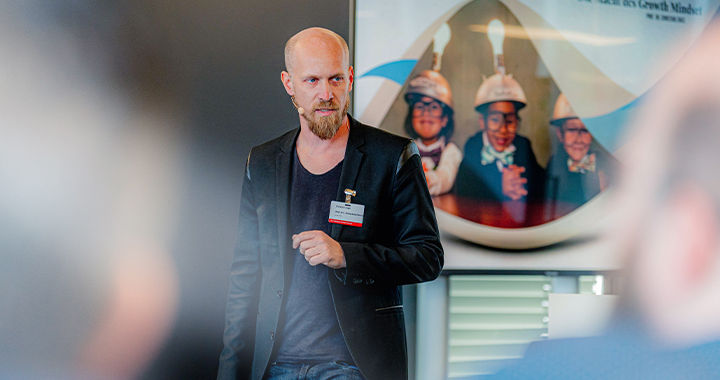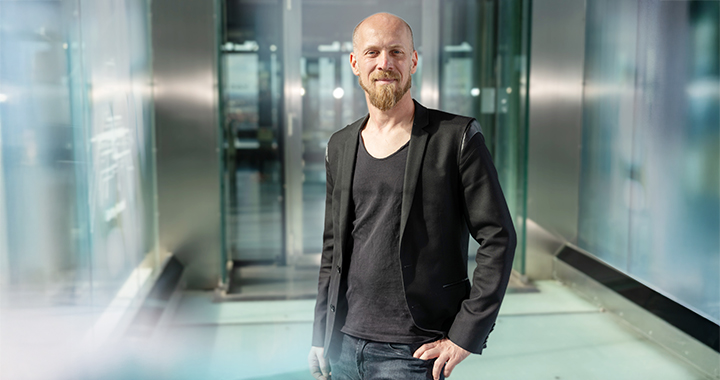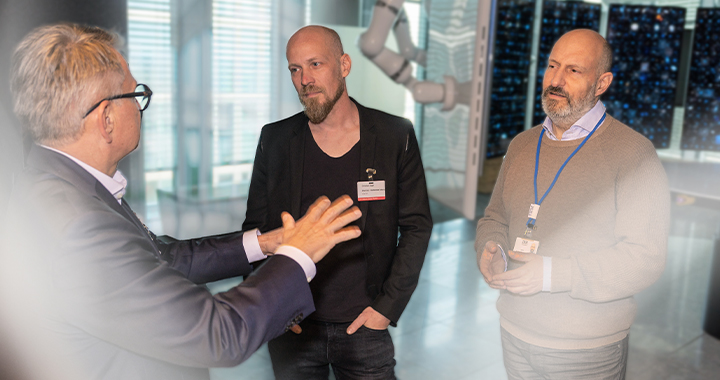

A reality check for AI: are we ready?
Bechtle’s System House Munich/Regensburg organised its first decision-makers’ get-together of the year in March. Around 60 CIOs, IT managers and department heads from SMEs met at the IBM Watson Centre in Munich to discuss the impact of AI as a catalyst for digitalisation, optimisation and standardisation. Following the meeting, we talked to three of the speakers about how they would assess the current state of the technology, the barriers to implementing AI and some successful use cases.
Is artificial intelligence a hype or a trend?
“Neither – it’s reality,” says a convinced Roland König, Managing Director of Bechtle’s System House Munich/Regensburg. “We’ve already arrived in the world of AI and are seeing a shift away from simple use cases, such as transcribing a videoconference, towards activities that are increasingly adding value, such as automating business processes. AI is set to change the world of work for good.”

“Nobody can really predict what the future of this technology is going to look like,” explains Dr Christian Zagel, Professor of Entrepreneurship, Innovation and Digital Future Technologies at Coburg University of Applied Sciences. “It could continue to evolve rapidly or stagnate somewhat, e.g. if employees refuse to use it. However, I’d say that AI has reached a degree of maturity in some areas that means it’s impossible to imagine life without it.”
Stephan Schnieber, AI Leader at IBM Technologies, agrees that it’s no longer a question of “whether” but “how”: “I see AI as absolutely essential. Companies have no choice but to tackle the issue. Anyone who buries their head in the sand or acts too late could end up sacrificing their competitiveness.”
Stephan Schnieber believes that one of the reasons why companies have been slow to embrace AI is an unwillingness to take risks and be innovative. Plus, he adds, digitalisation has not yet progressed far enough in Germany to supply the data that AI applications need. These are cautionary words in the face of a technology that offers a great many opportunities.

What drives technology acceptance?
As well as presenting technical challenges, digitalisation and the use of AI also call for a cultural shift and, in particular, for people to be willing to see technological advances as an opportunity, even if this means former certainties losing their validity.
Dr Christian Zagel talks of “creative destruction” in this regard, citing the example of farm workers who were worried about losing their jobs when tractors were being introduced. For the Industrial Revolution back then, read the VUCA world of today. VUCA – volatility, uncertainty, complexity and ambiguity – reflects the complex and unpredictable nature of a rapidly changing environment.

What drives technology acceptance?
As well as presenting technical challenges, digitalisation and the use of AI also call for a cultural shift and, in particular, for people to be willing to see technological advances as an opportunity, even if this means former certainties losing their validity.
Dr Christian Zagel talks of “creative destruction” in this regard, citing the example of farm workers who were worried about losing their jobs when tractors were being introduced. For the Industrial Revolution back then, read the VUCA world of today. VUCA – volatility, uncertainty, complexity and ambiguity – reflects the complex and unpredictable nature of a rapidly changing environment.
Quote: I’d say that AI has reached a degree of maturity in some areas that means it’s impossible to imagine life without it.
Dr. Christian Zagel, Professor for Entrepreneurship, Innovation and Digital Technologies of the Future at Coburg University of Applied Sciences

Which strategy is the right one in the face of major changes?
Roland König believes that being open to new technology is important in this context and that AI can play a key role in cushioning the impact of VUCA. He feels that it helps companies to make the right decisions in order to come up with agile and sustainable strategies. However, he adds, they must be aware that different use cases and tasks will also require different AI technologies.
“There is no universal AI that can solve everyone’s problems,” Roland König continues. “AI isn’t a standalone technology either; it needs people, and people ultimately need it. It’s only as part of this symbiotic relationship that AI will be able to be put to good use. Managers should be willing to permit change and get staff involved in the process right from the start. This is the only way to make sure that AI will be implemented successfully.”

Stephan Schnieber believes that people need to lead by example, a management style that actively embraces the consistent use of AI and thus ensures visibility, emulation and acceptance. What is needed, therefore, is a management culture that gives employees an intrinsic motivation to be enthusiastic about new technologies. Something else that people have to bear in mind in his view is that every change takes time and that there are differing points of view out there, especially between different generations. This is why he feels an innovation culture is required that brings everyone on board and creates transparency in both directions of an organisation, i.e. from the top down and the bottom up.

Stephan Schnieber believes that people need to lead by example, a management style that actively embraces the consistent use of AI and thus ensures visibility, emulation and acceptance. What is needed, therefore, is a management culture that gives employees an intrinsic motivation to be enthusiastic about new technologies. Something else that people have to bear in mind in his view is that every change takes time and that there are differing points of view out there, especially between different generations. This is why he feels an innovation culture is required that brings everyone on board and creates transparency in both directions of an organisation, i.e. from the top down and the bottom up.
Want to learn more about our AI services?
We can help you navigate the world of AI so that you can exploit its potential for the benefit of your organisation. Read more now on our information page.
AI is not a pipe dream. In fact, it’s already part and parcel of SME life.
Our article tells you about a number of real-life AI projects that we have already delivered for small and medium-sized companies.

What are the hallmarks of an innovation culture?
“Innovation culture is much more than a day-long creative workshop,” Dr Christian Zagel adds. “It stands in opposition to conservative and patriarchal systems and is shaped by how people interact. In particular, this includes making your staff feel valued and appreciated by communicating with them in a targeted way, e.g. by asking them what they think.” He believes that there is work still to be done in this area, not least in terms of training: in Germany, most courses still retain their traditional structure, with professors furnishing information in a lecture and students listening attentively – or not, as the case may be.

No kind of discussion takes place, he says, meaning that students often lack the skills they will need for the future, such as an ethical understanding of values, critical thinking and self-reflection – all of them key to navigating today’s VUCA world. AI has the capacity to solve challenges, he points out, but students need to subject its results to critical scrutiny: it’s a matter of tackling challenges head on and harnessing AI to grow with them instead of feeling overwhelmed. Besides an innovation culture that embraces new technologies, he says, we also need a clear AI strategy – and AI should increasingly be seen as a core component of corporate strategy rather than merely an add-on.

No kind of discussion takes place, he says, meaning that students often lack the skills they will need for the future, such as an ethical understanding of values, critical thinking and self-reflection – all of them key to navigating today’s VUCA world. AI has the capacity to solve challenges, he points out, but students need to subject its results to critical scrutiny: it’s a matter of tackling challenges head on and harnessing AI to grow with them instead of feeling overwhelmed. Besides an innovation culture that embraces new technologies, he says, we also need a clear AI strategy – and AI should increasingly be seen as a core component of corporate strategy rather than merely an add-on.
Roland König, Managing Director of Bechtle’s System House Munich/Regensburg

How to go about maximising added value with the right strategy
Roland König recommends using pragmatic examples to work out where you want to be, believing that you need to understand the processes in play in your company and recognise where AI can actually increase efficiency. “Firms should examine where AI can help add value and how they can optimise business processes right up to their clients’ level,“ he says. “Bechtle guides companies throughout their entire AI transformation. Our teams help to define use cases, implement them on the technology front and scale them up. Rather than being a process with a set beginning and end, AI is constantly evolving.”
Stephan Schnieber agrees: “A bit-part approach to AI, such as just using ChatGPT to write your texts, isn’t enough for a root-and-branch transformation of your business. Companies should think bigger and look ahead when it comes to choosing their use cases. IBM is working with Bechtle to validate the feasibility of and value inherent in possible use cases from the client’s perspective so that pilot projects can be implemented successfully and the risk on the company’s side can be minimised.”

What potential applications are already out there?
A forecast by the analysts at Gartner puts autonomous AI agents top of the list of the ten most important technology trends in 2025. Besides performing tasks, these agents are also responsible for steering, coordinating and optimising processes without any form of human intervention. IBM Technologies has already completed its first in-house AI projects using AI agents, Stephan Schnieber reports: “We use an assistance system for HR that currently handles up to 94 per cent of our personnel issues. This has enabled us to save valuable time, which we can now spend on activities that add value and benefit the whole workforce.”
Roland König agrees that AI agents can boost service: “A mobility client has been able to make routine tasks such as refunds, cancellations and account deletions highly automated thanks to an AI-supported dialogue system. This has made life easier for the Customer Service team, cut processing times and reduced the error rate significantly as well as bringing about a noticeable improvement in client satisfaction.”

What potential applications are already out there?
A forecast by the analysts at Gartner puts autonomous AI agents top of the list of the ten most important technology trends in 2025. Besides performing tasks, these agents are also responsible for steering, coordinating and optimising processes without any form of human intervention. IBM Technologies has already completed its first in-house AI projects using AI agents, Stephan Schnieber reports: “We use an assistance system for HR that currently handles up to 94 per cent of our personnel issues. This has enabled us to save valuable time, which we can now spend on activities that add value and benefit the whole workforce.”
Roland König agrees that AI agents can boost service: “A mobility client has been able to make routine tasks such as refunds, cancellations and account deletions highly automated thanks to an AI-supported dialogue system. This has made life easier for the Customer Service team, cut processing times and reduced the error rate significantly as well as bringing about a noticeable improvement in client satisfaction.”

Conclusion: act now?
Dr Christian Zagel, Stephan Schnieber and Roland König all agree that AI makes companies more competitive by making their business processes more efficient. We just need the confidence to lead from the front once in a while. As well as factoring the risks that AI could pose into our strategic planning, this also means considering the negative consequences of not introducing the technology in the first place. AI is not something that can be implemented overnight. The transformation will take time – a transition phase, in other words, in which companies can launch and evaluate selected pilot projects. So there is no better time than now to get started with AI!
Have questions about our solution and products? Simply write us an e-mail. We are happy to help.